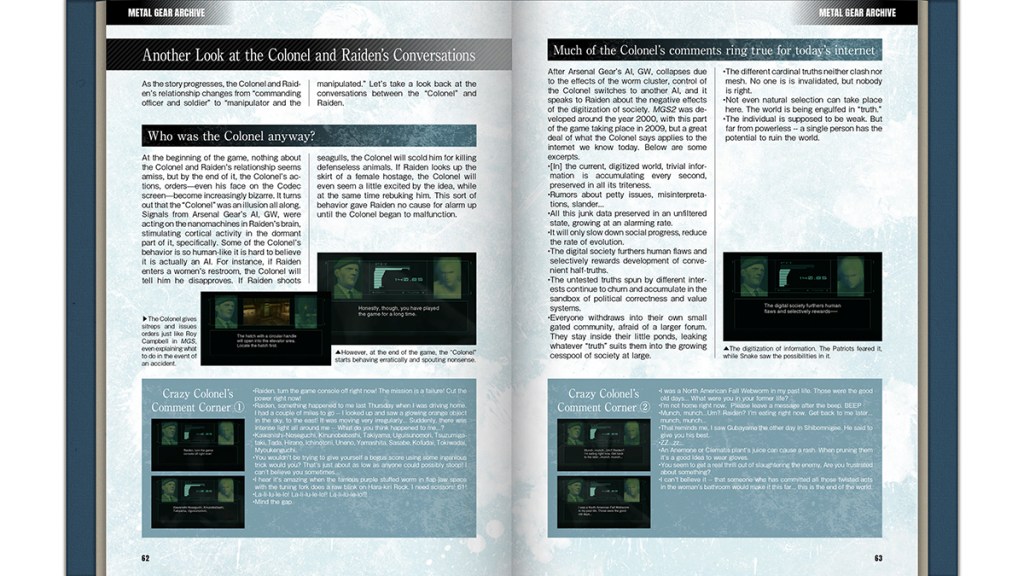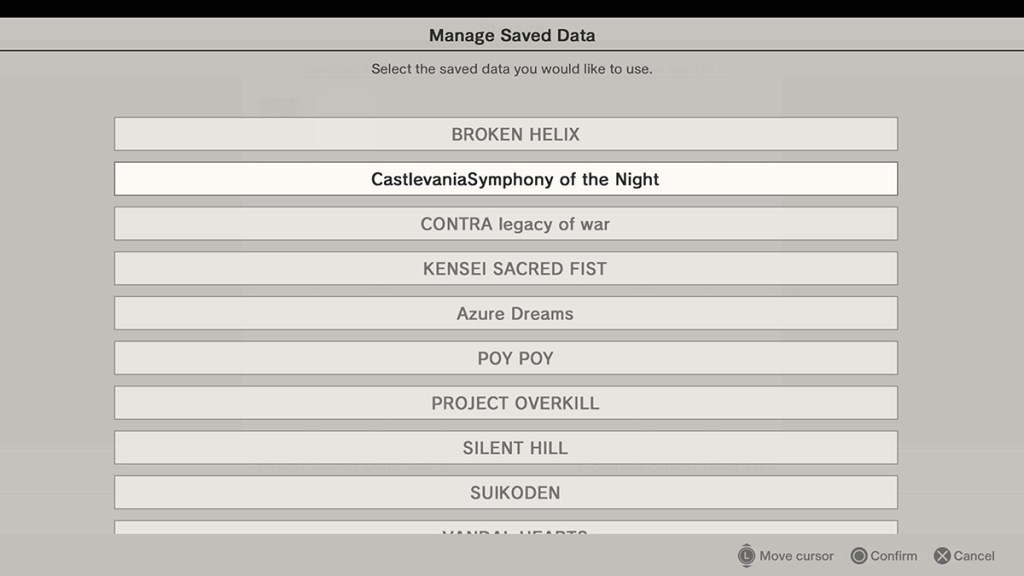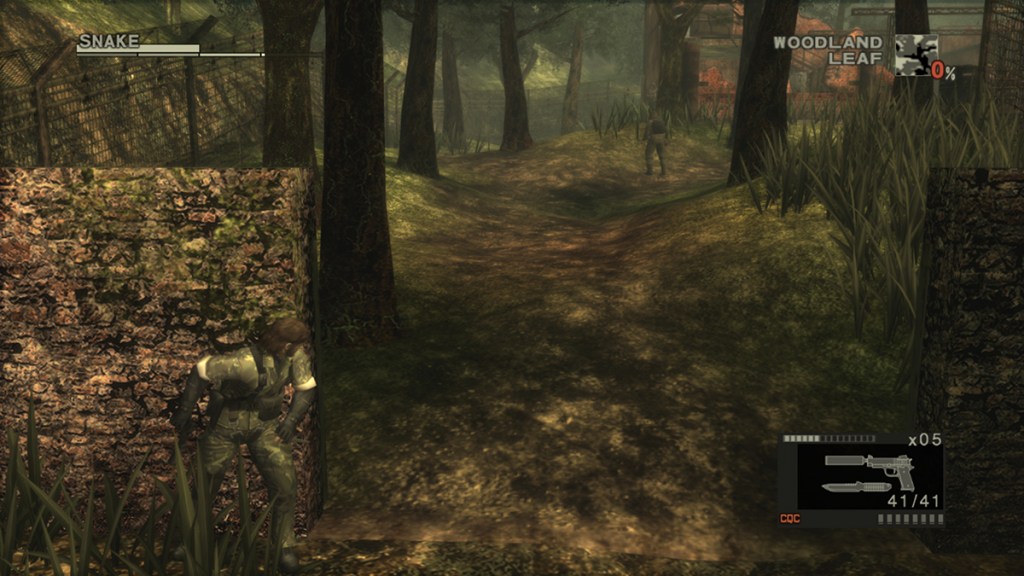Metal Gear has resurrected all sorts of previously dead characters — Colonel Volgin, Liquid Snake, Big Boss — and now it is attempting the most ridiculous resurrection yet: Konami. The company is now trying to claw back some of the goodwill it had before divorcing with Hideo Kojima through nostalgia-fueled rereleases and remakes. Metal Gear Solid: Master Collection Vol. 1 is the first example of this initiative meant to pander to players burned by Konami’s sinking standards. And while lacking in a few key areas, the bundle surprisingly rises above these rock-bottom expectations with its compilation of important games and lovingly composed extras.
Extras are what make packages like this more than just simple port jobs. All but one of the Metal Gear games comes with a Master Book with sections that speak broadly about the series and others that zoom in on the specific game in question. These chapters are extremely dense — anything attempting to explain Metal Gear lore would be — but it also lays it all out in a relatively easy-to-read manner with screenshots, Yoji Shinkawa’s classic art, and small symbols that clearly label what parts pertain to what installments. There’s even a long timeline with color-coded icons that separate fact from Metal Gear fiction, an exhaustive list of Easter egg guides, and full collectible walkthroughs, all of which add more richness to these supplemental materials. However, not being able to view these strategy guides while playing minimizes their usefulness.

Its ability to delve deeper beneath the surface is what makes this more than a simple throwaway PDF full of wiki entries. The Master Book also explains why these games were so important in their time, which is crucial for a celebratory collection like this. It goes into how Metal Gear Solid’s cinematic camera angles were revolutionary, the many details that made Metal Gear Solid 2 what it was, and Metal Gear Solid 3’s introduction of close-quarters combat, just to name a few. It misses some of the broader context, like the subversiveness of playing mostly as Raiden in MGS2, why there are two different Metal Gears, and MGS1’s ties to the PS1’s technology, but it’s still a pretty comprehensive digital tome on all things Metal Gear.
Those aren’t the only missing extras, though. Master Collection Vol. 1 has no video making-of features, a strange omission for a series with a few official documentaries. These would add variety to its text-heavy offerings and honor the important people who shaped the franchise. Some parts like the manuals, animated graphic novels, and half of the MGS1 versions are even annoyingly excluded from the initial download (and weren’t online before release). The Ape Escape crossover Snake vs. Monkey, Twin Snakes, the Game Boy Color version of MGS, and the 3DS remake of MGS3 are all also stuck in first-party prison and left as unplayable entries in the Master Book. Master Collection Vol. 1 has a generous suite of bonuses, yet its blind spots are noticeable; a shortcoming that was inevitable given the sheer volume of extras the franchise has accumulated over the years.

Some of the shortcomings related to the actual games seemed avoidable, given how many excellent retro collections from Digital Eclipse there are to draw from. Rewinding and save states should be a given for a package like this, but those features are inconsistently applied, if at all. Only the two versions of Metal Gear, Metal Gear 2: Solid Snake, and Snake’s Revenge have not-so-quick quick saving and rewinding is nowhere to be seen. Metal Gear Solid also has neither feature.
Omitting contemporary luxuries like this makes these throwback titles harder to go back to. Games this old can be abrasive at times and not implementing these modern assists is only going to limit their appeal and who gets to experience these important titles. Metal Gear Solid at least lets players pause cutscenes and add fake save data for Psycho Mantis to sift through, both of which are thoughtful additions.
But it’s not possible to pause cutscenes in the other two MGS games for some reason and just shows how straightforward and sporadic these ports are. These are the exact versions from the 2011 HD Collection down to the resolution, frame rate, and the loading screen icon that’s just the old HD port’s logo. Bluepoint Games did a great job with those HD rereleases, but the bar has been raised in the ensuing decade. Save states and rewinding have become commonplace in that time and would cut down on the time spent reloading and navigating menus here.

Even though most of these games don’t hide their age, it’s still clear why they have such a prominent place in gaming history. Metal Gear’s ability to mix off-the-wall humor and political drama creates unique stories that still stick out in the medium decades later, facets that are only aided by the fantastic cinematic presentation and voice acting. Kojima Productions’ commentary on nuclear politics and the endless war machine is still as sharp as ever and only proves how bold and ahead of its time the team was. The stealth gameplay may not be as fluid as recent entries in the genre — the fixed camera in the earlier games is limiting — but they are still full of small details and thrilling moments that only get better as the series progresses.
Metal Gear Solid: Master Collection Vol. 1 does not have everything that a modern collection should have. Its inability to ubiquitously implement modern features like save states and rewinding only keeps players from fully celebrating the history this compilation seems intent on celebrating. But the extras paint a decent portrait of its accomplishments by delving deep into its lore and speaking to almost every entry’s significance within the medium. And even though the actual games haven’t seen many improvements, they are still unique marvels generations later that lovingly balance quirky jokes and deadly serious diatribes about nuclear proliferation. The bundle largely captures what makes the franchise so beloved, even if some useful quality-of-life features have sneaked on by it.
-
The Master Book is organized well and full of valuable lore breakdowns and entries explaining each game’s impact
-
The Metal Gear Solid games have, for the most part, aged well and still stand out
-
Quicksaving is inconsistently doled out and rewinding is nonexistent
-
The extras are text-heavy and contain almost no videos or making-of materials
Disclaimer: This Metal Gear Solid: Master Collection Vol. 1 review is based on a PS5 copy provided by the publisher. Played on version 1.000.000.













